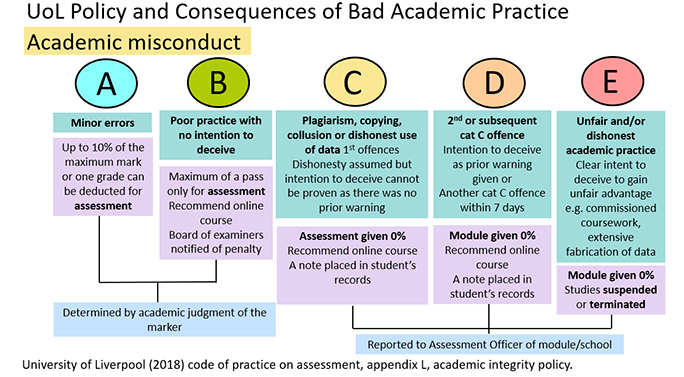Benefits
By taking time to consider how we design our programmes and/ or modules, we can promote good academic integrity (AI) practices. This limits the likelihood of academic misconduct. We can help our students understand AI and build good habits, reducing the amount of breaches requiring time consuming investigation.
Putting it into practice
Firstly we need to understand the different ways in which AI is breached, and the reasons students do so.
Within the University of Liverpool Code of Practice on Assessment there are 5 categories of AI breach, A, B, C, D, E.

(Parsons, 2019)
Essentially categories A and B refer to unintentional breaches such as mistakes in referencing conventions or forgetting to include a reference. Categories C, D and E are more serious and refer to intentional practices such as plagiarism, collusion, copying or contract cheating. The consequences for breaches to AI are varied but can be very serious, including exclusion from the University.
Students breach AI for a variety of reasons. These include lack of understanding regarding AI (McCabe, Butterfield & Trevino, 2006), how normalized academic misconduct is considered to be amongst their peers and the risk/ reward ratio associated with breaches (Rettinger & Kramer, 2009, Medway, Roper and Gillooly, 2018). Practicalities such as running out of time to complete work, pressure to achieve good grades (Simkin & McLoed, 2010) and the wide-spread availability of essay mill services (Newton, 2018) also contribute.
So how can we promote AI when designing curricula?
- Ensure the concept of AI is explicitly addressed early in your programme. One way to achieve this is to ensure your students complete the on-line Academic Integrity tutorial (part of the KnowHow Academic Success module on VITAL) before submitting their first assignment; however AI needs to be revisited throughout the programme.
- Make sure you change your assignment title, data set, experiment or practical every year. This does not mean changing the method of assessment, just the assignment specifics. This makes it harder for students to use previous students’ work.
- Use more authentic assessments. Students are more likely to cheat if they do not see the relevance or purpose of their assessments (Cole & Kiss, 2000) and these assessment types are harder to procure than essays.
- Utilise formative assessments. Providing students with clear feedback and feedforward prior to summative assessments allows students to practice and refine their approach in a safe, non-credit bearing environment.
- Have students complete an AI activity at least once a year; this could be peer reviewing referencing or building a reading list (Rhodes, 2019) and include debates or discussions regarding commonly experienced AI dilemmas.
- Encourage students to seek help early if they are encountering difficulties, before cheating starts to feel like the only answer to their problems.
- Avoid assessment bunching! Find out what other modules have deadlines in the same week as your own and discuss as a programme team staggering deadlines; multiple concurrent deadlines increase the chances of academic misconduct.
- Ensure students are well supported in their academic and language skills development. Students driven to succeed but struggling academically or linguistically can be more susceptible to AI breaches (Fass-Holmes, 2017).
- Warn students of the dangers of contract cheating, not just in terms of University policy but also the wider dangers of essay mills. Some steal students’ work and sell it to others, or blackmail students after purchase.
- Make explicit links between ethical practices in your disciplinary area and ethical practice as a student. Academic misconduct can lead to unethical workplace practices (Carpenter, Harding, Finelli & Passow, 2004) so highlight the importance of AI to their future careers.
References
Carpenter, D. D., Harding, T. S., Finelli, C. J., & Passow, H. J. (2004). Does academic dishonesty relate to unethical behavior in professional practice? An exploratory study. Science and engineering ethics, 10(2), 311-324.
Cole, S., & Kiss, E. (2000). What can we do about student cheating?. About Campus, 5(2), 5-12.
Fass-Holmes, B. (2017). International Students Reported for Academic Integrity Violations: Demographics, Retention, and Graduation. Journal of International Students, 7(3), 664-669.
McCabe, D. L., Butterfield, K. D., & Trevino, L. K. (2006). Academic dishonesty in graduate business programs: Prevalence, causes, and proposed action. Academy of Management Learning & Education, 5(3), 294-305.
Newton, P. (2018). How Common is Commercial Contract Cheating in Higher Education?. In Frontiers in Education (Vol. 3, p. 67). Frontiers.
Parsons, B. (2019) Academic Integrity Tutorial, University of Liverpool [Online].
Rettinger, D. A., & Kramer, Y. (2009). Situational and personal causes of student cheating. Research in Higher Education, 50(3), 293-313.
Rhodes, C. (2019, July) Students build their own reading lists: an experiment in digital fluency. Presentation at University of Liverpool Learning and Teaching Conference, Liverpool, UK
Simkin, M. G., & McLeod, A. (2010). Why do college students cheat?. Journal of Business Ethics, 94(3), 441-453.
University of Liverpool (2018) code of practice on assessment, appendix L, academic integrity policy.
Help and Feedback
Can you help us improve this resource or suggest a future one? Do you need this resource in an alternative format? Please contact us at cie@liverpool.ac.uk

Designing Academic Integrity into Curricula by Ceridwen Coulby is licensed under a Creative Commons Attribution-NonCommercial 4.0 International License.
